

Why Students Forget—and What You Can Do About It. Teachers have long known that rote memorization can lead to a superficial grasp of material that is quickly forgotten. But new research in the field of neuroscience is starting to shed light on the ways that brains are wired to forget—highlighting the importance of strategies to retain knowledge and make learning stick.
In a recent article published in the journal Neuron, neurobiologists Blake Richards and Paul Frankland challenge the predominant view of memory, which holds that forgetting is a process of loss—the gradual washing away of critical information despite our best efforts to retain it. Future - An effortless way to improve your memory. When trying to memorise new material, it’s easy to assume that the more work you put in, the better you will perform.

Yet taking the occasional down time – to do literally nothing – may be exactly what you need. Just dim the lights, sit back, and enjoy 10-15 minutes of quiet contemplation, and you’ll find that your memory of the facts you have just learnt is far better than if you had attempted to use that moment more productively. Although it’s already well known that we should pace our studies, new research suggests that we should aim for “minimal interference” during these breaks – deliberately avoiding any activity that could tamper with the delicate task of memory formation. So no running errands, checking your emails, or surfing the web on your smartphone. 35 Psychology-Based Learning Strategies For Deeper Learning.
35 Psychology-Based Critical Thinking Strategies by Sara Briggs, opencolleges.edu.au.
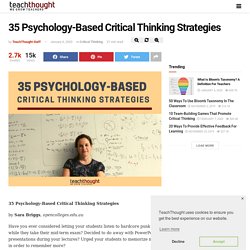
6 Strategies for Taking High-Quality Notes. The good news is that teachers can show their students how to take better notes. Even better, good note-taking activities are themselves learning processes that can help students think metacognitively about their own studying, and can improve their retention of course material. A virtuous cycle! Six Powerful Note-Taking Strategies 1. When Memorization Gets in the Way of Learning - The Atlantic. Memorization has enjoyed a surge of defenders recently.
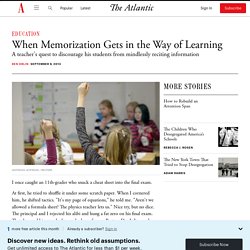
They argue that memorization exercises the brain and even fuels deep insights. They say our haste to purge old-school skills-driven teaching from our schools has stranded a generation of students upriver without a paddle. They recommend new apps aiming to make drills fun instead of tedious. Most of all, they complain that rote learning has become taboo, rather than accepted as a healthy part of a balanced scholastic diet. Certainly, knowledge matters. I define memorization as learning an isolated fact through deliberate effort. When Memorization Gets in the Way of Learning - The Atlantic. The Teenage Brain Is Wired to Learn—So Make Sure Your Students Know It. Adolescence is an exciting time as teenagers become increasingly independent, begin to look forward to their lives beyond high school, and undergo many physical, emotional, and cognitive changes.
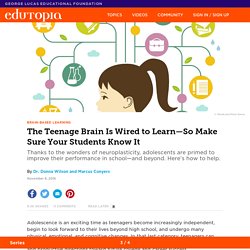
In that last category, teenagers can learn to take charge of their developing brains and steer their thinking in positive and productive directions toward future college and career success. The brain’s prefrontal cortex, which functions as the control center for executive functions such as planning, goal setting, decision making, and problem solving, undergoes significant changes during the teenage years. In an NPR interview, Laurence Steinberg, author of Age of Opportunity: Lessons From the New Science of Adolescence, notes that ages 12 to 25 are a period of extraordinary neuroplasticity.
Edutopia. With so many classroom research studies published daily, you can be forgiven for missing some.
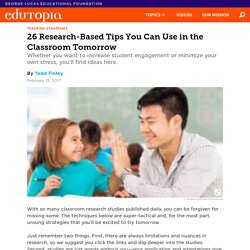
The techniques below are super-tactical and, for the most part, unsung strategies that you’ll be excited to try tomorrow. Just remember two things. First, there are always limitations and nuances in research, so we suggest you click the links and dig deeper into the studies. 30 Universal Strategies For Learning. 30 Universal Strategies For Learning by Terry Heick As teachers, we’re all trying to better understand how people learn–not now they’re taught in terms of teaching strategies, but more so learning strategies–only not really strategies.
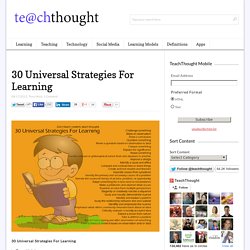
Learning actions, or cognitive actions. Smart Homework: Can We Get Real? Here’s the first of a several-part series on smart homework practices, adapted from Rick Wormeli’s seminal book about teaching in the middle grades, Day One & Beyond: Practical Matters for New Middle Level Teachers.

What’s most remarkable about Wormeli’s discussion? How relevant and comtemporary it feels, a decade after he wrote it! The homework controversy continues, and Rick continues to offer great advice on this topic in workshops and presentations across North America. We’ve included some additional references for you at the article’s conclusion.
Effective teaching of Study Skills. 5 Practical Learning Tips Based On How People Do. 5 Practical Learning Tips Based On How People Do–And Don’t–Learn by Charlie Chung, Class Central There has been a large body of work in neuroscience, psychology, and related fields offering more and more insight into how we learn.
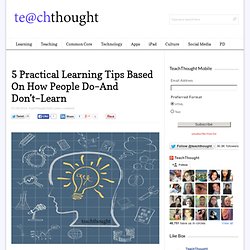
Below are five of the top tips from Barbara Oakley, Professor of Engineering at Oakland University, who has faced her own learning challenges (failing middle and high school math and science classes), and has made a study of the latest research on learning. Why Homework Matters. As an elementary/middle school teacher, I hear constant complaints about the issue of homework.
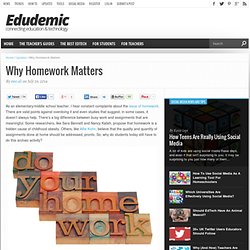
Ultimate Guide to Becoming a Better Student. Good study tips and habits can make a tremendous difference in understanding academic subject matter, and improving test scores.
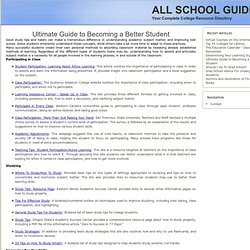
Some students inherently understand these concepts, while others take a bit more time to adapt to these practices. Many successful students create their own personal methods to absorbing classroom material by tweaking already established methods of learning. Study Vibe - How to study - study skills for primary and high school students. Study Skills. Becoming a successful student is not a matter of chance or even academic ability. Tips for Effective Study. The most common barrier to success encountered by college students is a lack of effective techniques for study and exam preparation.
The Science: The Growth Mindset - Mindset Works®: Student Motivation through a Growth Mindset, by Carol Dweck, Ph.D. Why the Growth Mindset? 5 Study Skills to Accelerate Your Learning. You may have heard that we now live in something called a “knowledge economy.” One big implication is the premium put on the ability to ramp up your knowledge about new topics.